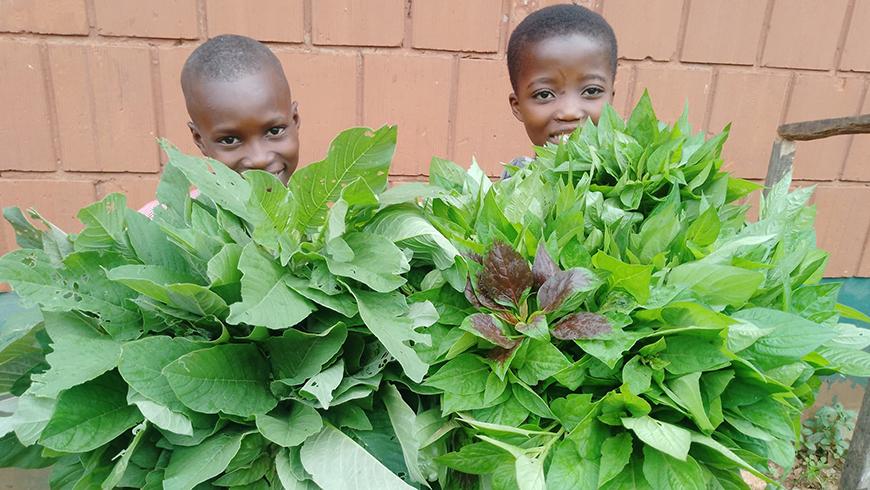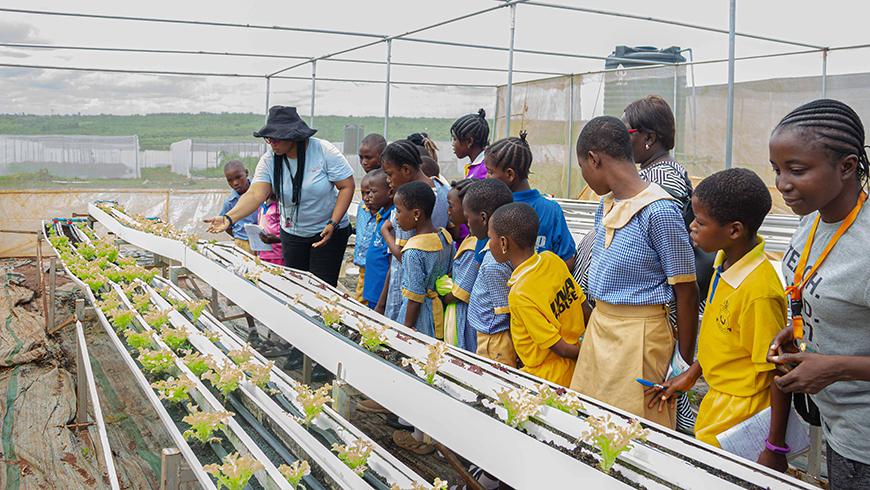Cultivating change: How school gardens are sowing seeds and inspiring student leadership in Nigeria

I was born into a low-income family of six children in North Bank, Makurdi, Benue State, Nigeria, where my siblings and I experienced firsthand the impact of food insecurity and limited access to educational resources. My parents, despite earning less than USD $50 monthly, made sacrifices to ensure my siblings and I received a quality education. However, their limited financial resources meant we had to navigate our studies amidst hunger, lack of learning resources, and financial constraints. My mother’s backyard garden always served as a life-saver and as the day went by, I could see myself honing my love for gardening. This desire informed my study of agriculture as an undergraduate.
Two years after graduation, I joined the Teach For Nigeria fellowship and was posted to an underserved school in Oke Yeke, Abeokuta, Ogun State. Three months into the fellowship, I observed how food poverty, often linked to drought and long dry spells, and hunger limited the potential and affected school attendance and academic performance of children in my community, especially the girls who became victims of unwanted pregnancy and early marriage due to teenage girls being driven to exchanging sex for food and families who would rather give their daughters off to early marriages to reduce the burden of feeding them. . Upon carrying out a survey in my classroom, I found that six out of every 10 learners who missed school were doing so due to hunger. The 2012 United Nations World Food Program statistics reveal that a staggering 66 million children attend school hungry every day with 23 million in Africa alone, greatly impacting their ability to learn. According to the 2024 Nigerian Economic Summit Group (NESG) report “Status of Food Security,” over 100 million Nigerians are currently food insecure, 49% of whom are children.
In my own classroom, I saw a seven-year-old student faint during school activities due to hunger. To meet the urgent nutritional needs of my learners, I initiated a fundraising campaign to provide them with lunches. Recognizing the temporary nature of this solution, I sought sustainable alternatives, which led to the creation of the STEM Garden Initiative. The initiative teaches learners how to grow their own food and become self-sufficient. Instead of waiting for solutions, they became solution providers. The gardening activity, which integrates Science, Technology, Engineering and Mathematics with hands-on gardening experiences, fosters eco-awareness, promotes sustainable practices, and develops student leadership, preparing them for the future of work.
Through the fundraising campaign, I received a total of $1,500 in grants from Pollination Project Foundation and Earth Quest, seed donations from SENCE-Agric, and educational resources from the Nigeria Conservation Foundation. With these resources, I mobilized a diverse team of 10 volunteers consisting of students, educators, heads of school, and community influencers to design a comprehensive garden curriculum and implement an innovative program. Additionally, I partnered with Soilless Farm Lab, Awowo, a large modern farm in the community, enabling my learners to visit the farm and gain hands-on experience in greenhouse construction and a clear expectation of our solution. With the support of the Chairman of the Association of Primary School Headteachers Ogun State Nigeria (AOPSHON), Ogun State Universal Basic Education Board (SUBEB) and the Parents Teachers Association (PTA) Chairman, we were able to extend this initiative to other schools and families.

Within two years, we established 30 school gardens and climate clubs across six Local Government Areas in Ogun State, empowering over 3,500 learners with STEM skills, gardening skills, seeds, and financial literacy to start their backyard gardens. Again, I collaborated with the Ogun State Universal Basic Education Board (SUBEB) through the State Education Secretary to train 100 teachers on how to integrate climate education and sustainable agriculture in the curriculum to help students understand how their lived reality is being shaped by climate change and ways to mitigate its impact. 150 families can now access fresh vegetables, generate income from excess produce sales, and support their children's educational needs.
We are building student leadership through this initiative by allowing our students to make key decisions; from researching, identifying strategies to address the problem, and deciding what plants to grow, they also directly manage the activities of the garden including sales of vegetables to raise funds thereby honing their entrepreneurship skills. The knowledge gained from the STEM Garden club has helped them to excel in competitions, as shown in a global Inter School climate champion league organized by Earth Quest, where they emerged as the first runner-up in 2023 and 2024, respectively.
Feedback surveys from school administrators and parents reported an 80% increase in learners’ attendance and a 30% increase in academic performance, and five learners who are generating money from their backyard garden and supporting their studies. These outstanding results led to the STEM Garden Initiative being nominated and winning the Teach For Nigeria 2024 most outstanding "Be the Change" project and featured as a case study in the Teach For All Global STEAM and Climate Educators learning series. This milestone showcases the need to equip students with the mindsets, knowledge, and skills they need to thrive in their careers and grow as leaders
Our initiative continues to inspire individual and organizational actions as a good number of fellows at Teach For Nigeria have replicated our model as their Be the Change project. International organizations like Garbage Free Indian, Kids Who Farm and Agridiversity have also reached out to learn about our model as well as share best practices of improvement in our initiative.
At the system level, our initiative was recognized by the education secretary in Ogun State and is being integrated in the curriculum across 56 schools in Abeokuta South.
Reflecting on my journey, I would say being passionate, committed, and having a sense of purpose is the first approach to making great impacts in small places. Additionally, the power of the community in collective leadership is paramount in any initiative because “only the hood can heal the hood”.